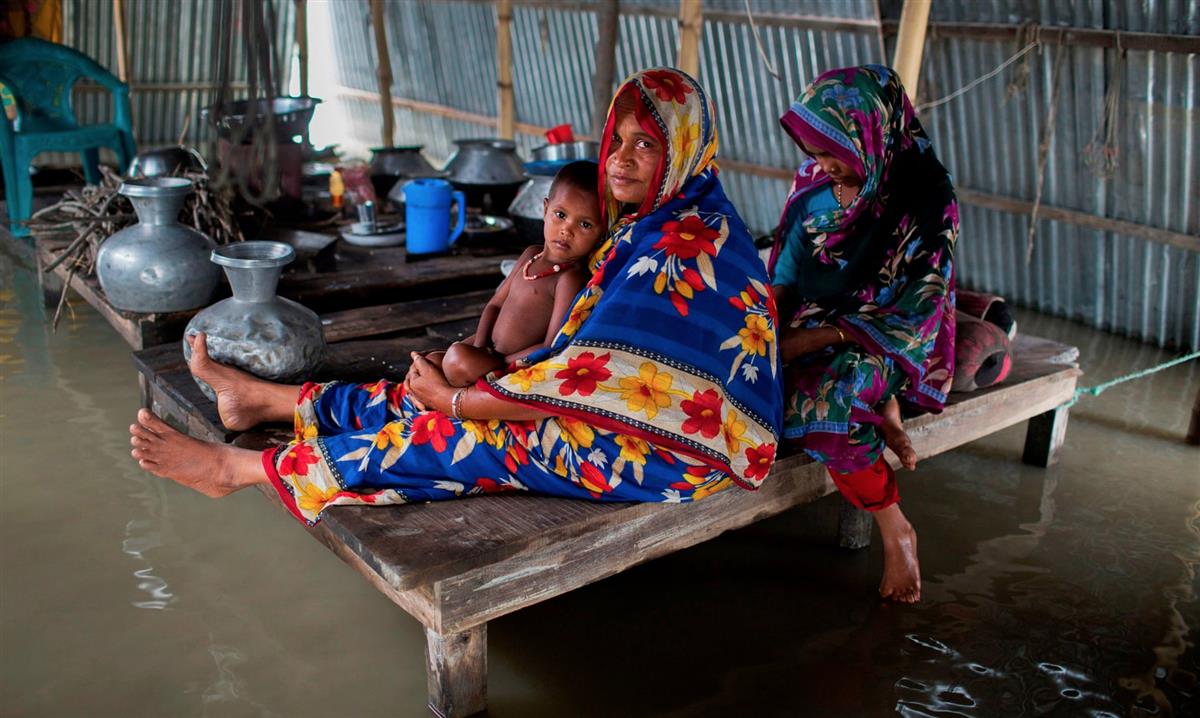 A flood-affected family in Kurigram, Bangladesh on 26 July 2019. ‘Poorer countries, which broadly speaking are the least to blame for the climate crisis, will suffer most.’ Photograph: Suman Paul/AFP/Getty Images
A flood-affected family in Kurigram, Bangladesh on 26 July 2019. ‘Poorer countries, which broadly speaking are the least to blame for the climate crisis, will suffer most.’ Photograph: Suman Paul/AFP/Getty Images
Editorial
Record temperatures in Europe and the US have reinforced the danger of global heating for many inhabitants. But others are and will be far worse hit
Wed 31 Jul 2019 18.30 BST Last modified on Wed 31 Jul 2019 21.46 BST
We tend to learn better from experience than from what we have simply been told. So for many in Europe, sleepless nights and suffocating buses or workplaces have helped to make real the threat posed by global heating. Now statistics are reinforcing the message. Last week the UK had the hottest day on record: 38.7C in Cambridge. New records were set in Germany, Belgium and the Netherlands in July, and June was the hottest month in US history. The Met Office says that the UK’s 10 hottest years on record have all been since 2002.
Heatwaves naturally occur in summer, but they did not used to be so hot, or so frequent. Experts say that the UK’s sweltering weather last summer was made 30 times more likely by global heating. That link has sunk in: in a new survey, 77% believed the recent heatwave was partially or wholly caused by the climate crisis. As temperatures reach unprecedented levels, so does public concern about the environment.
Yet while global heating is just that, its impact varies even within countries. Most people surveyed in July considered the weather too hot. But, while 73% of people in the east of England judged it too hot, in chillier Scotland only 47% of people agreed – and a slightly larger proportion thought it just right or not warm enough. Some may look forward to warmer staycations and the chance to grow grapes in their back garden.
Even those alarmed by July’s heat may not envision the full scale of the climate crisis. The connection between global heating and heatwaves seems self-evident. It’s intuitively harder to link it to other extreme weather events, and to take in experts’ warnings that Britain seems to be getting wetter as well as warmer. It’s more difficult still to fully comprehend how harsh its impact will be elsewhere.
For many people, even a small rise in temperatures will be catastrophic. A new report from Monash University in Melbourne warns that the climate crisis is already causing deaths; one of its authors said almost 400 people died from heat stress and heatstroke during fires in Victoria 10 years ago. It predicts climate-related stunting, malnutrition and lower IQ in children within the coming decades; a 2018 report from the World Health Organisation predicted that an additional 250,000 deaths a year will occur between 2030 and 2050 due to global heating.
Some places will experience more severe temperature shifts or will find it harder to adapt than others, often through lack of resources. Poorer countries, which broadly speaking are the least to blame for the climate crisis – emitting less carbon dioxide per capita – will suffer most. A hurricane or wildfire is deadlier when there is little capacity to prepare for it or to speed recovery. Families that spend most of their income on food struggle to eat when crops suffer.
A recent study found that global heating has already increased global inequality: in most poor countries, higher temperatures are very likely to have resulted in lower economic output than they would otherwise have enjoyed, while richer nations were not harmed to the same degree, and some were potentially able to actually benefit. Bangladesh and sub-Saharan African nations are among those hit. The research ties in with previous projections that by 2100 the average income in the poorest countries will be 75% lower than it would be without climate change, and that some wealthy countries might even see higher incomes.
Yet none of these problems will be fully contained within national borders. Drought and famine are already forcing families from Guatemala, Honduras and El Salvador to attempt to migrate to the United States when they are unable to feed themselves. A World Food Programme study of Central American migrants found that almost half were food insecure. A 4C rise this century, which is now considered a realistic prospect, would produce at least 300 million refugees and drown cities in the US and China. It is the duty of richer nations to do all they can to hold back the soaring temperatures which they did most to produce, and to take what action they can to mitigate their impact – abroad as well as at home. It is also in their self-interest.
SOURCE: THE GUARDIAN